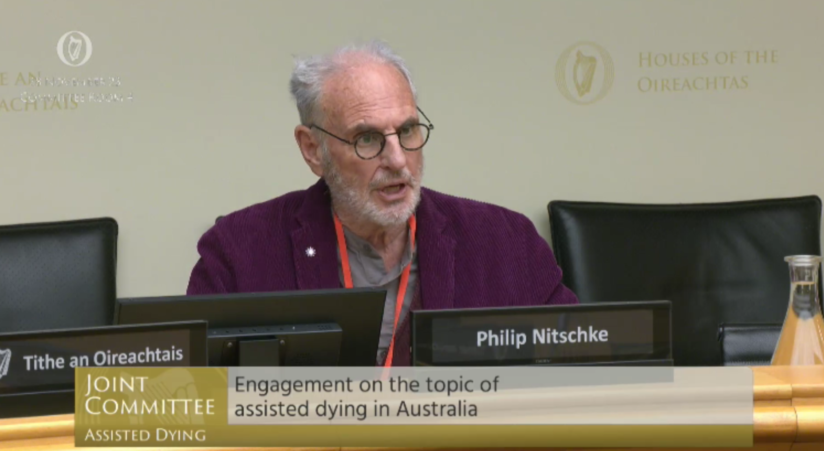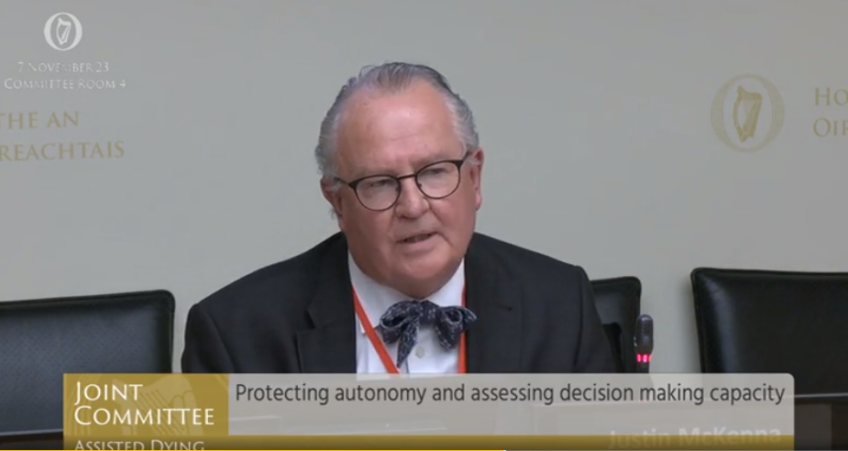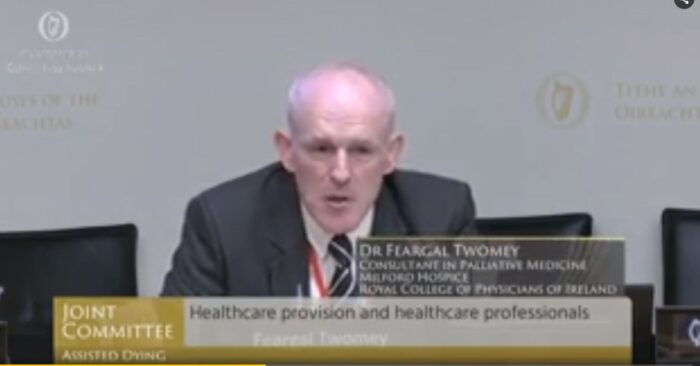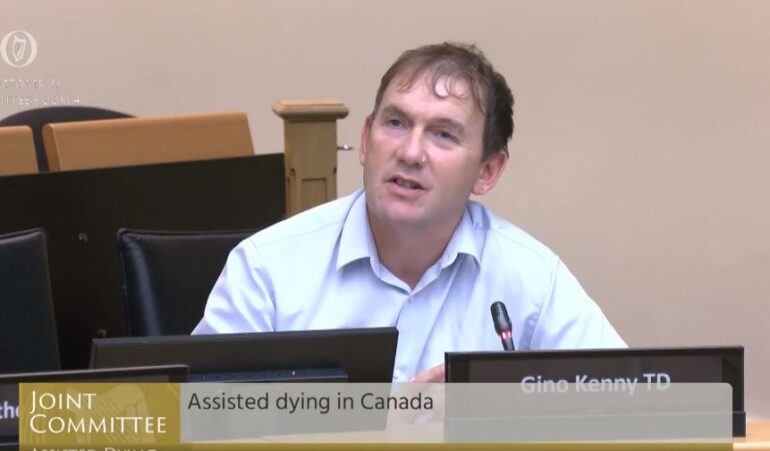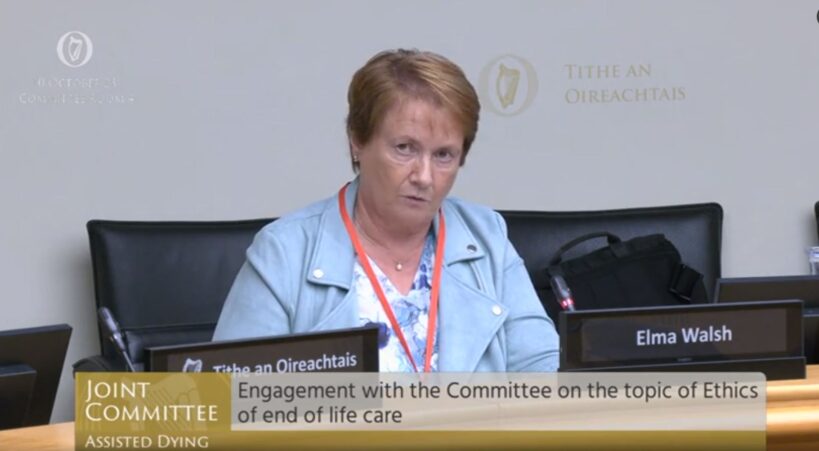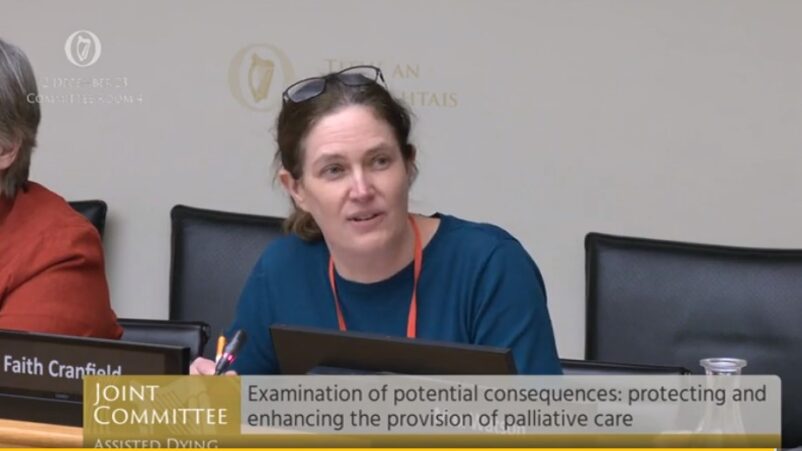
Palliative care doctors in Ireland and the UK were before the Oireachtas Committee on Assisted Dying last week and very firmly and eloquently explained why they are against euthanasia. It is extremely noteworthy that the group of doctors who are the most dedicated by reason of their branch of medicine to those nearing the end of their lives are also typically the most strongly opposed to assisted suicide.
Dr Faith Cranfield (pictured), speaking on behalf of the Irish Palliative Medicine Consultants Association, told committee members that her biggest concern is that the availability of assisted suicide or euthanasia would impact the ability of palliative care practitioners to effectively and humanely address the suffering of their patients, as they do everyday, because it will offer immediate death as a remedy instead.
She asked the committee to imagine the case of ‘Mary’, who has cancer, is overwhelmed by a sense of despair and wants to die. The family hears her expressing this wish and is tempted to feel the same way. But palliative care steps in and her situation becomes far more manageable. She experienced many other valuable moments in her life with her family. In a world with euthanasia, would this happen, or would Mary be ushered towards euthanasia instead?
Dr Matthew Doré, secretary of the Association of Palliative Medicine for Great Britain and Ireland, said that in Canada, hospices have been shut on the basis that they were not facilitating ‘medical assistance in dying’, and there is now an existential crisis in its workforce.
Professor Max Watson, who has worked in hospices for more than 35 years, including with the Irish Hospice Foundation said: “It is very difficult to see safeguarding working because in every legislation where it started, those safeguards are then attacked in law”.
“I am suspicious of safeguards because I have not seen them really work. Today’s safeguards are what another section of the population will take to court on the grounds that they are being legislated against. A person who is depressed could demand access to the same things as people who have a terminal diagnosis. Once we embark on this we are heading towards a situation where it comes down to people’s individual choice”, Prof. Watson told the Committee.
Dr Doré seconded Prof. Watson’s opinion: “The very proponents for this legislation admit to its arbitrary criteria and thus seek to extend it, and if legalised will succeed, as it becomes a question of equality of access for a ‘treatment’. In Canada in 2016 it was clearly stated that the country would not end up like Belgium and would be an exception. Do we think Ireland is going to be an exception to this tried and tested international trend?”, he asked.
Dr Regina McQuillan, representing the Irish Palliative Medicine Consultants Association, maintained that introducing assisted suicide legislation may pressure individuals with serious illnesses. The option of assisted suicide or euthanasia can create what she called “unintended coercion”, i.e. making individuals feel obliged to choose it to relieve the burden on their families, even if not explicitly stated by their loved ones.
She said that the concept of assisted suicide is initially introduced to prevent a difficult death, but then it evolves to also address the desire to escape a difficult life. This shift alters people’s knowledge, desires, and expectations, leading to broader societal transformations. “Putting it into healthcare confuses things further”, she said.
Dr Matthew Doré drew parallels with historical cases of wrongful executions, emphasising the potential for mistakes when determining who should be euthanised. He argued that “incorrect deaths” can result from various factors, including misdiagnosis, unpredictable prognoses, fluctuating choices, mental health issues, elder abuse, and financial concerns. He raised concerns about the societal impact of legalising assisted suicide and questioned what percentage of such “incorrect, unnecessary deaths” would be deemed acceptable.
“An incorrect death is a death mismatched with the rationale for having an assisted death. It is a consequence of pre-empting the unknowable. As lawmakers, committee members will know laws balance individual liberty against societal safety. We have speed limits because driving over 30 km/h on O’Connell Street risks other people, the pedestrians. All traffic laws, all domestic laws, all criminal laws, – it is why we have prisons – are balancing individual choice versus society. Your individual liberty is limited to how it affects other people. My question to the committee is: what percentage of incorrect, unnecessary deaths in the population due to the legalisation of assisted suicide would be acceptable? I suggest none”, Dr Doré said.
Professor Watson spoke about the effect of ‘assisted dying’ legislation on the quality of health services: “We have seen a deterioration in countries which have introduced assisted dying. Australia has decreased end-of-life care. It has gone down two places in the league table, from fourth. The Netherlands has gone down. New Zealand has gone down eight places since 2015. Switzerland has actually improved. Canada has gone down 11 places in terms of overall indices. Belgium has gone down 21 places. It is not universal in all countries but there is a trend that where assisted dying has come in, the quality of end-of-life care, as previously assessed, has decreased.”
Last week’s session was one of the most informative so far. The palliative care doctors spoke from their daily experience with terminally-ill patients and their message to the Committee was really clear: do not legislate for ‘assisted dying’. Will the members of the Committee listen to them? Deputy Gino Kenny certainly was not. Listening to his questions, you would almost think he knew more about dealing with the terminally ill than those who do it every day.

